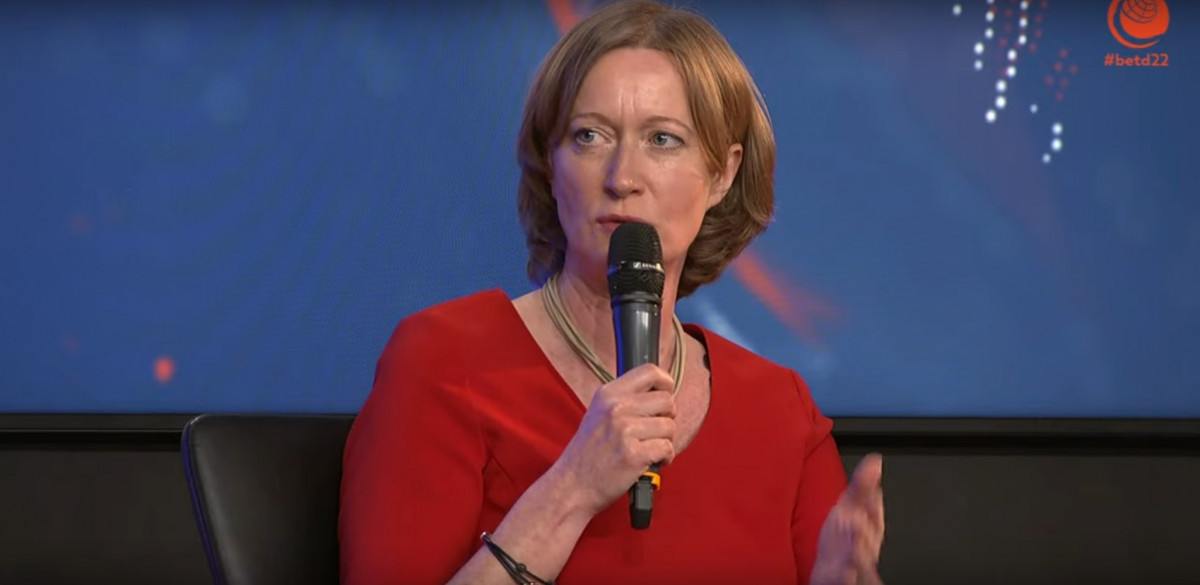Energy industry calls for gas supply priority list of German companies

Kerstin Andreae is chair of the executive board of the German Association of Energy and Water Industries (BDEW). Before taking on that job in 2019, the Green Party politician was a lawmaker in federal parliament, the Bundestag. Here, Andreae served as vice-chair and economy policy spokesperson of the Greens’ parliamentary group.
Germany has triggered the first stage of its national gas supply emergency plan over fears that Russia might soon cut supplies if it doesn't receive payments from foreign buyers in roubles. Read the article here.
Clean Energy Wire: How do you assess today's announcement by the government of an early warning stage for gas supply shortage?
Kerstin Andreae: It is an important step: we are now taking the formal route of convening a crisis team. There is no supply shortage yet, but we want to be prepared for a nationwide supply shortage and this would require close communication between the parties involved. These companies, institutions and authorities must create as much clarity and legal certainty as possible. This is definitely the right step now. But I can also understand why the federal government hesitated, because this is a step that has to be communicated well to avoid concerns.
The emergency plan itself defines protected and non-protected customers. In the latter category, we propose to draw up a positive list of those who must continue to be supplied, regionally and based on systemic relevance, for example when it comes to food or pharmaceuticals. It is incredibly difficult to sort out the complexities. And for the companies and the grid operators we need a similar level of legal certainty. Because if the worst comes to the worst, shortage will occur very quickly.
We don't expect [Russian] deliveries to be cut off from day 1.
The situation may indeed become serious by next winter. However, how serious is it today? Is there enough gas in storage to keep the industry running all summer even without Russian gas?
I would warn against that way of thinking. Relying on storage is a viable option, but the storage we have, and that's what the term means, is storage and, above all, storage for next winter. That is why we should rather work now on efficiency, on alternative sources of supply, on substitution, on not using the storage facilities if possible. We should instead use market instruments, long-term options, to fill the storage facilities even further, because the real challenge will come next winter. If we empty the storage facilities this summer, we will be less prepared for winter.
So, a detailed list of which companies will no longer receive gas and when is not needed in the coming weeks?
No, that will only be used when the emergency stage kicks in. That is the third stage. We have three stages: early warning, alert and emergency. Only in the emergency stage do we talk about protected and non-protected customers. What needs to be done now is to communicate with the companies, with the network operators, to specify these criteria to enable us to make decisions quickly in the emergency stage. We have 750 network operators who can now sit down with the companies that they supply and consider what must be done in this situation.
When should we expect the emergency level to kick in? As of Thursday, Russia will likely only accept rouble payments for gas deliveries.
We don't know yet. We will first get information from the Russian side on Thursday about how they think the new contracts should be structured. And then there are several contracts that are designed in such a way that payment is always made for one month. So, actually, the next month is already paid for. But it varies depending on the contract design. In other words, we don't expect the deliveries to be cut off from day 1. But when exactly the gas shortage will occur is not at all predictable, it is totally speculative, because it depends on the weather, it depends on efficiency measures, it depends on what alternative solutions the affected companies can come up with today, together with their network operators.

